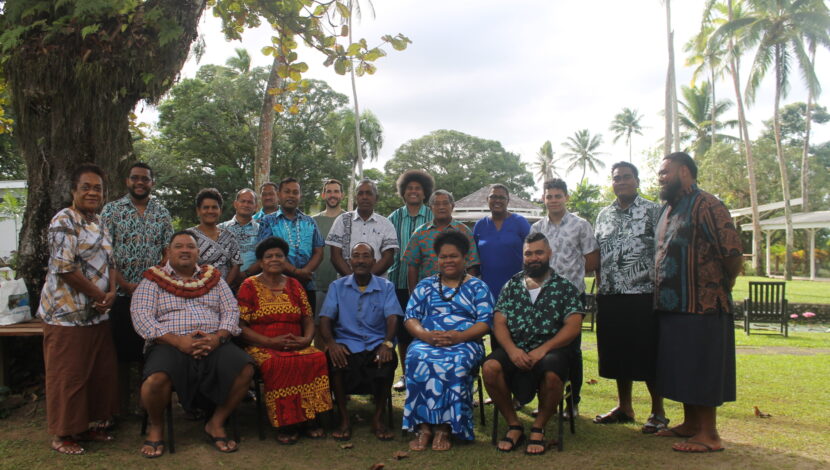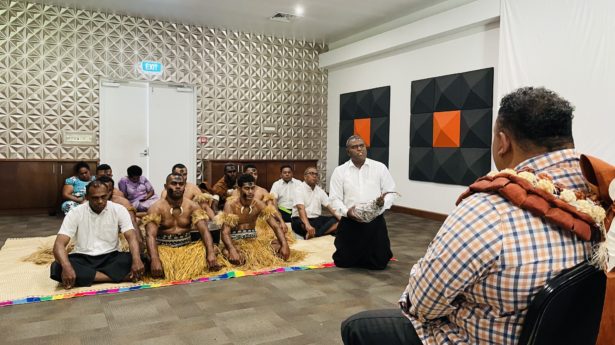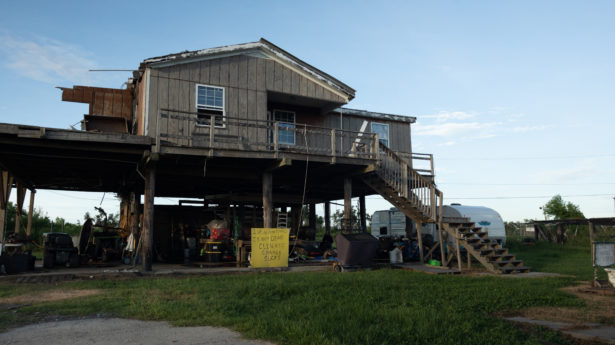The Unitarian Universalist Service Committee advances human rights through grassroots collaborations.
UUSC Partner Gatherings Co-Create Space to Discuss Climate Crisis

By Salote Soqo on August 17, 2022
During the pandemic, as UUSC staff heard a resounding need for spaces where folks could safely come together and be in community with each other. Without hesitation, UUSC mobilized resources and started working with partners to co-design spaces where we could share stories and strategies. This led to two gatherings in Fiji during May and June 2022.
The gatherings were powerful, filled with stories of resilience, strength, and determination. There were moments of joy, heartbreak, frustration, gratitude and humor as partners shared their experiences of having to live through multiple crises caused and exacerbated by the COVID-19 pandemic, cyclones and the ongoing impacts of the climate crisis—impacts that are disproportionately borne by communities in the Pacific Islands.
The first gathering was organized by Climate Tok, a local organization based in Fiji who has been UUSC’s partner since 2018. Climate Tok brought together community leaders from 14 frontline villages around Fiji who are facing the risks of climate-forced displacement. UUSC was honored to be invited into this space to support Climate Tok’s leadership and to observe the discussions. Community leaders bravely shared stories of how they experienced the impacts of cyclone Harold in 2020 at the height of the COVID-19 pandemic and how they continue to witness the slow and ongoing impacts of sea level rise and changing weather patterns that have led to significant loss and damage of community infrastructure, land and subsistence practices.
Communities who relocated due to climate change impacts shared their experiences prior to, during and after relocation and the effects to their spiritual and emotional well-being and culture. The loss of land, access to land rights and land use was a significant concern for many community leaders. Comm also shared their fatigue and frustration of having to re-tell their stories many times over without seeing any benefits to their communities. The gathering was conducted in the i-Taukei language (indigenous Fijian language) and this allowed communities to share more context, which provided more breadth and depth in the discussions. We risk losing these aspects in English-speaking spaces.
The second gathering included 18 partner representatives and community leaders from seven UUSC partner organizations across the Pacific Islands who are fighting to save their homes from the climate crisis and to advance climate justice. UUSC partner, the Pacific Climate Warriors skillfully, and with respect and humility, facilitated our four-day gathering. It was a gift to witness the Warriors in their convening role and to experience their “mana” (Indigenous wisdom and power). Partners described the challenges of doing their work during the pandemic, such as the inability to travel and the loss of income and ability to afford basic human needs. They also shared opportunities that emerged during the pandemic, such as the technological capacity they had to build to engage with others in a virtual space and the opportunity to slow down and focus on their health and families. Addressing loss and damage was an important part of the discussion and partners shared the need to prioritize projects to support frontline community strategies to reduce, minimize and avert the direct impacts of loss and damage. There were also discussions about the need to coordinate and connect policy advocates with grassroots communities to ensure that their voices and needs were reflected in policy spaces.
“In the early morning as everyone slept, I heard a loud thunder. It was a sound that I will never forget. I saw the rain and soil filling up my village. I screamed for people to wake up and run. Our village was completely buried. We were trapped. The soil had buried a young family alive in their own home. It wasn’t until a few days later when help arrived. Emergency responders that dug out the buried family told us that the mother and her two children were found curled up in the living room, her arms tightly clasped around her two children. We do not speak about it because it hurts”
Litiana Tiqe of Tukuraki Village in Fiji shared this story of the landslide that displaced her village in 2012, leaving them homeless for several years before they were relocated in 2017.
Litiana Tiqe’s story provides an insight into the multiple layers of impacts that are experienced by communities, at a personal and community level and the fact that communities can be living with these impacts for a period of time. It also highlights the importance of creating safe spaces where communities can share their stories and the need for more sustainable and holistic responses to addressing loss and damage.
Aside from the learnings above, a number of important themes also emerged:
- Cultural competency is very important in shaping and informing how we support frontline communities
- Spirituality, trauma-informed responses and emotional well-being are critical factors that should be included in how we support frontline communities and in policy responses to address loss and damage and advance climate justice
- Communities are not monolithic—there is great diversity across partners and within communities
- Language justice is critical in narrative building and policy making
- Co-creating safe spaces with communities for narrative sharing and strategy building is critical
UUSC is committed to working collaboratively with our partners to ensure that mitigating and adapting to the impacts of climate change are done in ways that rely on Indigenous wisdom and sovereignty.
Photo Credit: Ariela Zibiah

